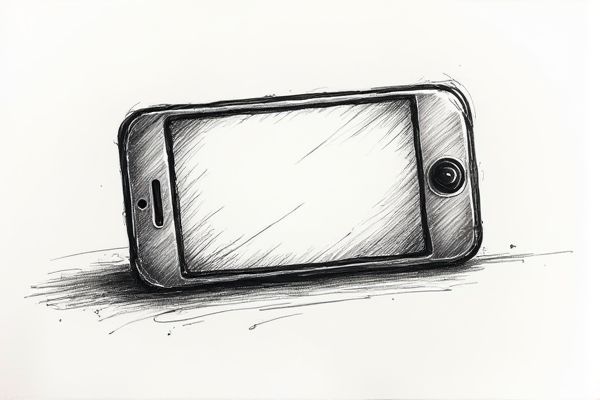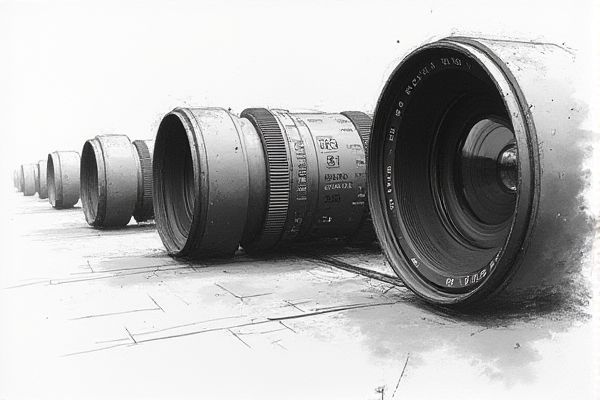In the ever-evolving world of smartphones, the importance of a high-quality camera cannot be overstated. With technological advancements, several brands have emerged as leaders in providing exceptional camera capabilities that cater to both amateur photographers and seasoned professionals. From stunning low-light photography to impressive zoom features, these brands have set the benchmark for what a camera phone can achieve. If you're looking to capture life's moments in exquisite detail, read on to discover the top brands that dominate the camera phone market.

Illustration of camera phone
Best brands of camera phone in 2025
Apple iPhone
Apple's iPhone series has consistently set the standard for camera phones, with significant advancements such as the introduction of the dual-camera system in the iPhone 7 Plus in 2016, Night Mode in the iPhone 11 series in 2019, and the 48-megapixel main camera in the iPhone 15 Pro Max, which combines high-resolution frames for highly detailed 24 MP shots. The iPhone 15 Pro also excels in low-light conditions and detail preservation, as seen in DXOMARK tests. The latest iPhone 16 models feature a 48MP Fusion camera with a 2x Telephoto option and enhanced Ultra Wide camera capabilities. These innovations have made iPhone cameras renowned for their vivid image rendering, high detail capture, and advanced features like Photographic Styles and spatial photo capture. With each new release, Apple continues to enhance image quality, low-light performance, and creative features. For more details on the iPhone 16, you can visit their official news page.
Samsung Galaxy
Samsung Galaxy smartphones are renowned for their advanced camera technologies, having evolved significantly since the first Galaxy model in 2010. They feature high-resolution image sensors, such as the 16MP ISOCELL camera introduced in the Galaxy S5, and innovative technologies like dual-aperture and up to 100x zoom in models like the Galaxy S20 Ultra. These cameras also utilize AI and deep learning for object recognition and detail enhancement, ensuring clear photos even in low-light conditions. As of 2023, Samsung held a 19.4% global smartphone market share, with around 226.6 million smartphones shipped worldwide. For more insight into their cutting-edge phone camera technologies, visit their dedicated page.
Google Pixel
The Google Pixel series has established itself as one of the top producers of camera phones, with the Pixel 9 delivering excellent performance on par with other current flagship devices, as evidenced by its high scores in DXOMARK Camera tests, including a photo score of 116 and video score of 120. The cameras are enhanced by the Google Tensor G3 chip, enabling advanced AI tasks such as HDR+ technology and intelligent tone mapping, which significantly improve image quality even in low light conditions. Discover more about the AI technology behind Google Pixel cameras.
Huawei P Series
The Huawei P Series is renowned for producing some of the best camera phones on the market, with the Huawei P50 Pro and P60 Pro consistently topping DXOMARK Camera rankings. The P50 Pro, released in 2021, achieved an overall score of 144, surpassing the Xiaomi Mi 11 Ultra by one point, and excelled in all photo sub-categories except preview. The P60 Pro, launched in 2023, took the top spot in the DXOMARK Camera ranking with class-leading still image quality and outstanding performance in low-light conditions, particularly with its ability to freeze motion and capture sharp subjects even in dynamic scenes. These devices are praised for their excellent exposure, dynamic range, and color accuracy, making them ideal for various photography needs. The P60 Pro also features a unique variable aperture, enhancing its depth of field and overall image quality.
Xiaomi Mi Series
Xiaomi's Mi Series is renowned for producing some of the best camera phones on the market, with models like the Xiaomi 14 Ultra and Xiaomi 13 Ultra standing out for their exceptional camera capabilities. These phones feature advanced camera systems, including Leica Professional Optical Lenses, 1-inch ultra-large sensors, and variable apertures, ensuring top-notch image quality. As of 2024, Xiaomi is the second-largest smartphone manufacturer globally, with a market share of about 12%. The Xiaomi 14 Ultra, in particular, boasts a quad-camera setup with a 1-inch Sony LYT-900 sensor and a Leica lens, making it a strong competitor to other flagship devices. This emphasis on camera technology has solidified Xiaomi's position as a leader in mobile photography. For more details on the best Xiaomi camera phones, follow the provided link.
OnePlus
OnePlus has established itself as a top contender in the camera phone market, particularly through its partnership with Hasselblad, a renowned camera manufacturer, which began in 2021 and has significantly enhanced the image quality of OnePlus devices. This collaboration has resulted in true-to-life colors and exceptional image quality, with the OnePlus 12 featuring a 64MP 3x periscope lens and a main 48MP sensor that produces vibrant and detailed photos. The cameras on OnePlus phones, such as the OnePlus 12, are capable of capturing high-quality images, even in low-light conditions, thanks to the advanced technology and optical image stabilization (OIS). The partnership has led to a notable improvement in mobile photography, making OnePlus a preferred choice for photography enthusiasts. With features like 100W fast charging and a powerful Snapdragon 8 Gen 3 chipset, OnePlus phones offer a comprehensive package for both photography and overall performance. Learn more about the OnePlus and Hasselblad partnership.
Sony Xperia
Sony Xperia is renowned for its exceptional camera capabilities, as evident in the Xperia 1, which features a triple-lens setup including a 24mm main camera, 16mm ultrawide camera, and an 85-170mm variable zoom telephoto camera, offering up to 7.1x optical zoom and 4K HDR video recording at up to 120fps. Despite some limitations, such as issues with HDR triggering and exposure in bright light, the Xperia 1's autofocus is fast and accurate, even in low light conditions. The brand's expertise in camera technology, honed from its professional imaging products, translates well to its smartphones, making them a strong choice for photography enthusiasts. The Xperia 5 V, for example, boasts a dual camera setup with a 48MP main snapper and 12MP ultrawide, delivering natural-looking colors and great detail levels. Sony's commitment to camera innovation is clear, with features like AI-assisted autofocus and high-end color profiles like S-Cinetone. For a detailed review, visit Sony Xperia 1 Camera Review.
Oppo Find
The Oppo Find X7 Ultra stands as a pinnacle in camera phone technology, achieving the top spot in DXOMARK's smartphone camera ranking with a record-breaking camera score of 157. It excels in various conditions, including indoor, night-time, and portrait photography, thanks to its advanced HyperTone Camera System and Hasselblad tuning. The device boasts four 50MP cameras, including a Sony second-generation 1-inch sensor, and delivers exceptional bokeh and video capture, with a video score of 156. Its ability to capture 10-bit Dolby Vision HDR video at 4K resolution further solidifies its status as an imaging champion. This makes the Oppo Find X7 Ultra an unparalleled choice for photographers and filmmakers. For more information, you can visit their official press release.
Vivo X Series
The Vivo X Series is renowned for its exceptional camera performance, particularly the Vivo X100 Pro, which excels in various lighting conditions thanks to its large 1/0.98'' Sony IMX 989 sensor, delivering low noise levels and good detail across all zoom settings. It achieves impressive results in low light, outperforming compact cameras, and offers advanced video capabilities including 8K resolution at 30 fps and 4K at up to 60 fps. The series also benefits from Vivo's dedicated V3 image processing chip, enhancing processing speed by 20% compared to its predecessor. Additionally, the X100 Pro features a 50MP ultra-wide-angle camera and a 50MP telephoto camera with 4.3x zoom, both with autofocus and optical image stabilization. These advancements make the Vivo X Series a top choice for photography enthusiasts.
LG V Series
The LG V series is renowned for its impressive camera capabilities, making it one of the top choices for photography enthusiasts. The LG V60 ThinQ 5G, for example, boasts a 64MP primary sensor with 4-to-1-pixel binning, resulting in 16MP images, and a 13MP ultra-wide camera with a 12mm field of view. It achieves an overall DXOMARK Camera score of 100, though it falls slightly behind current flagships in some aspects like zoom and low-light performance. The device excels in dynamic range and color rendering, making it suitable for high-contrast scenes. Additionally, it can record 8K footage at 30 frames per second, although 4K mode offers the best image quality. For detailed insights, check out the LG V60 ThinQ 5G Camera Review.
















Leave a Reply
Your email address will not be published.